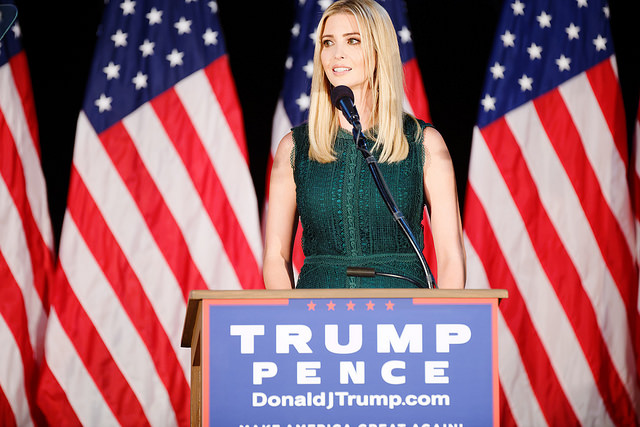
Ivanka Shows How “Jewish Woman” Is Not the Same as “Jew”
Last week, CNN published a profile of Ivanka Trump that focused on her Jewish observance, titled “Ivanka Trump: America’s Most Powerful Jewish Woman.” There is much to criticize in the piece. The authors pry into her conversion to Judaism, a subject which many Jews believe is strictly off-limits, as there are supposed to be no distinctions among Jews based on how they became members of the Jewish people. Simultaneously, they use Ivanka’s observance to paint her as an innocuous mother figure, whose primary focus is building a Jewish home — a perspective that at best ignores and at worst distracts from her role as a complicit member of her father’s administration. The problems with the piece, though, pale in comparison to its title and the few lines that allude to it.
Many who read the piece took to Twitter to criticize it. Jewish women in particular responded to the claim that Ivanka is America’s most powerful Jewish woman; they jokingly provided counterexamples that included Ruth Bader Ginsburg and their own Jewish grandmothers. While there was significant backlash around the accuracy of the headline, though, its more basic problem went unaddressed. To ask who the most powerful Jew in America is fundamentally trades in anti-Semitism.
The article’s introduction includes this: “Ivanka is arguably the most powerful Jewish woman in America today, someone who has long had a special influence on her father (though doesn’t always win him over) and is now settling in as an unpaid adviser to the President.” The image of the country’s most powerful Jew, whispering in the ear of the government’s leader, could be ripped from an anti-Semitic cartoon.
The Twitter commentators who mock the suggestion that Ivanka is more powerful than Ruth Bader Ginsburg miss the subtext of the article. Of course Ivanka is not the most powerful Jewish woman in the country. But the “power” that CNN attributes to her is the power that Jews always have in anti-Semitic imaginings: a secretive influence. Ivanka is not the most powerful Jewish woman, but she’s the woman who has power in the most Jewish way.
How has the deep anti-Semitism of CNN’s framing gone unaddressed as the article makes its way around the Jewish internet? What about the headline makes it slide under the radar? Well, after all, “Jewish woman” is not the same as “Jew.” “America’s most powerful Jew” is an anti-Semitic headline — “America’s most powerful Jewish woman” reads differently.
The anti-Semitic tropes that we in the Jewish community have been sensitized to leave us imagining men. A Jew, in the mental image we conjure up, is male, and so when Jewish women are subjected to anti-Semitic language and action, it is harder to recognize. Ivanka is depicted as whispering in her father’s ear to influence policy, and we see that not as a tired caricature but, instead, as natural. If we are comfortable with the idea that women’s power comes through their relationships to men, the framing of Ivanka’s power as that of stealthy influence seems typically female, not anti-Semitic.
The failure to recognize the anti-Semitism of CNN’s headline is the result of Jewish communal failure to include Jewish women in our collective imaginings of what it means to be a Jew. As long as we unconsciously assume that it’s normal for women’s power to come through their influence over men, we won’t notice when tropes about Jewish influence are applied to women. And as long as “Jewish woman” lands differently on our ears than “Jew,” we will allow anti-Semitic sentiment and action to be perpetuated, unacknowledged, against women.
Avigayil Halpern is a rising junior at Yale. Follow her on Twitter at @avigayiln.
The views and opinions expressed in this article are the author’s own and do not necessarily reflect those of Lilith Magazine.



